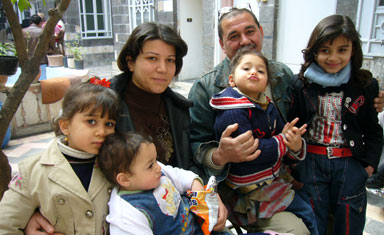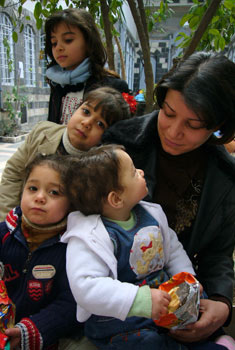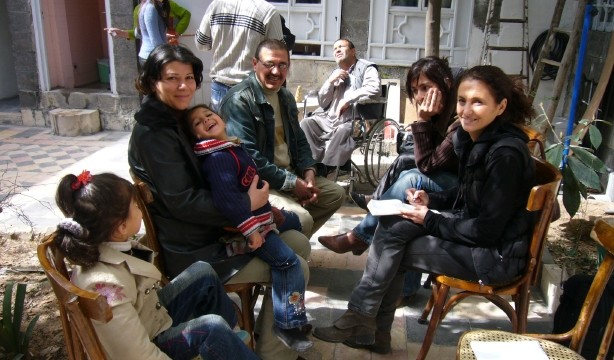
Photo : EC/ECHO/Daniela Cavini
DAMASCUS – Their Syrian neighbours lent them the clothes they are wearing for this interview. “I want to look respectable” says the head of family, Jamil “I shaved – which I haven’t done for weeks. You know, once you lose hope, your dignity as a human being goes down the drain as well”.
The murder of Margaret Hassan
It wasn’t always like this. Only four years ago Jamil Abdullatif, 44, had a decent job, a house in Baghdad and a normal life. He was the driver and logistician of CARE International, a humanitarian aid organization established in Iraq since 1991. For years he had been driving aid workers around his country, to provide food and health assistance to vulnerable Iraqis, mainly children. But on October 19, 2004, the head of Iraq operations, Margaret Hassan, was abducted and believed murdered by unidentified gunmen. Her body has never been found. As a result, CARE suspended its operations in the country. Jamil lost his job and started to have heart problems. “After Margaret’s death – he recalls – the Iraq office was closed. I was assigned to transfer our vehicles to the CARE office in Jordan. One day, right at the border between the two countries, I collapsed. It was my first heart attack.”
The aftermath

Photo : EC/ECHO/Daniela Cavini
For the Abdullatifs, it was just the beginning of their problems. In 2005 the violence intensified, ravaging the Sunni district where they lived. One day their house was hit by a rocket and caught fire. In minutes, half the building was reduced to cinders, with all their belongings inside. Still Jamil, a Sunni, and his wife Hoda, a Shiite, could not conceive of leaving Iraq. They wanted their three daughters to grow up in their own country. They took refuge in a Shiite quarter where they thought they would be safer. They weren’t. In less than a month, they had received a threatening letter telling them to move or to face death. It was October 2006, and the time had come to leave for good.
The escape to Syria
Syria seemed to be the best possible option. It was the closest, the cheapest, and the most welcoming solution.
The family found a place to rent, but it was virtually a slum. They discovered another apartment, where they stayed for eight months. A new baby girl was born. When the owner raised the rent, they could no longer afford to live there, and had to move again. Their savings were quickly vanishing and the family ended up in a public park. It was summer and hot, and something had to be done for the children. So Hoda’s mother came all the way from Iraq to collect them. Jamil, with his cardiac condition, had no prospect of treatment back in Iraq so he and Hoda stayed, sleeping in a garden and searching for a way to get medical treatment. Just as they were running out of hope, the Syrian health authorities, with the support of Terre des Hommes arranged a heart operation for Jamil. It was July 2007. A future beat again in Jamil’s chest and his family life.
The family is now reunited in Damascus, sharing a one-room apartment in Dahlie El Asad. But the future is still uncertain as Jamil’s physical condition prevents him from working, he has no income or savings, and the older children have been traumatised. Help is available from Terre des Hommes, which is running a programme including psychosocial support for around 5,000 children and their families. The Abdullatifs have also now received refugee status and are registered with UNHCR. The Commission’s Humanitarian Aid department provides funds for the work of these and other relief agencies helping Iragi refugees in Syria.
Daniela Cavini
ECHO Regional Information Officer – Amman

